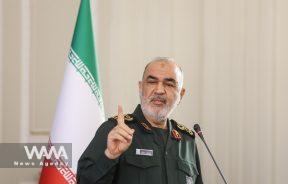Iranian Reformists’ Delusion: Splitting Europe and the U.S.
WANA (Nov 25) – 1. The spokesperson for Iran’s Ministry of Foreign Affairs has confirmed that a meeting between Iran and the European troika (the UK, Germany, and France) is set to take place in the coming days.
According to the spokesperson, this meeting is planned to occur in New York. However, during discussions in New York, the Europeans naturally avoided mentioning any anti-Iranian resolution by the IAEA Board of Governors.
Iran’s decision not to suspend the Geneva talks, even temporarily, and its insistence on engaging with Europe—despite the ink on their anti-Iranian resolution barely having dried—indicates that Iran is resolute in becoming “Europe’s bargaining chip.” Through its actions, Iran seems to emphasize that it assigns no significant weight to itself in the fundamental shifts currently unfolding in the international system.
There is neither dignified diplomacy nor respect for the Iranian people’s honor at play here. Likewise, the so-called Resistance Axis, under fire from America and Europe’s regional allies, appears to hold little relevance—particularly Hezbollah, which is increasingly isolated.
2. According to the Iranian Foreign Ministry’s spokesperson, these discussions are set to begin with regional and international issues, not Iran’s nuclear program!
Given that the U.S. has explicitly stated it will not return to the nuclear JCPOA and that new negotiations over Iran’s nuclear file are necessary, Europe seems intent on resuming talks with Iran, focusing on regional matters instead.

Larijani: Iran Ready for a New Nuclear Deal with Trump
WANA (Nov 22) – Ali Larijani, advisor to the Supreme Leader, has announced Iran’s readiness to negotiate a new nuclear agreement with the Trump administration. Speaking to Khamenei.ir, Larijani said: “I have heard the new U.S. administration has stated, ‘We do not accept the previous JCPOA… it is not sacred text.’ Fine, let’s discuss a […]
In simpler terms, a “regional JCPOA” will take precedence over the nuclear JCPOA. Europe will likely make the conclusion of a regional agreement with Iran a precondition for any progress on the nuclear deal or partial sanction relief.
Currently, a regional JCPOA would entail Iran agreeing to:
–Facilitate a ceasefire with Hezbollah, possibly disarming the group;
–Reducing the influence of resistance forces in Iraq, Syria, and Yemen;
–Voluntarily limiting its missile program;
–Committing not to collaborate on arms production or transfer with countries like Russia.
3. Mohsen Rezaee, former commander of Iran’s Revolutionary Guards, rightly pointed out that one goal of the anti-Iranian resolution passed by the IAEA Board of Governors—initiated by the European troika—is to turn Iran into a bargaining chip for Europe in its dealings with Trump’s America.
Europe aims to leverage Iran as a pressure point on Trump regarding Ukraine. By forcing Trump to align with the joint U.S.-European approach under Biden, Europe seeks to prolong the war in Ukraine, preventing a rapid resolution. Such an outcome would inevitably lead to Russia’s victory, which would further weaken Europe against Moscow.

Iran’s Response to the IAEA Resolution: Deployment of a Significant Set of New Advanced Centrifuges
WANA (Nov 22) – The head of the Atomic Energy Organization of Iran (AEOI), in response to the anti-Iranian resolution passed by the IAEA Board of Governors, issued orders for effective measures, including the deployment of a significant set of new and advanced centrifuges of various types. A joint statement by Iran’s Ministry of […]
Thus, Europe positions Iran as a card against Trump, signaling that if he does not support Europe on Ukraine, they might adopt a stance on Iran contrary to American interests.
4. The misguided policy of “driving a wedge between Europe and the U.S.”—one of the most serious and damaging cognitive and perceptual errors in Iran’s foreign policy apparatus—has gained renewed enthusiasm in this context.
Iran appears ready to become a tool for Europe to pressure the U.S., while naively perceiving its closeness to Europe as a source of security. This misguided excitement has led Iran to make significant concessions, even contorting its policies in bizarre ways, to enhance “unilateral trust-building” with Europe and present itself as a more reliable instrument in their hands.
5. The IAEA Board of Governors’ resolution—backed by the European troika and the U.S.—effectively gives Israel a green light to launch a significant attack on Iran’s nuclear facilities.
By portraying Iran’s actions as outside its commitments and emphasizing the constructed narrative of Iran as a “regional threat,” the resolution acts as a blank check for Israel. The Israeli regime, which views Iran as an existential threat, interprets Tehran’s signals of weakness and hesitation as an opportunity.
Thus, alongside its concerns about Iran’s nuclear capabilities, Israel finds the current climate conducive to delivering a heavy, preemptive strike on Iran’s nuclear facilities. This, in turn, could allow Israel to impose its will in negotiations over Lebanon, the situation in Syria, and the activities of resistance forces.

Adoption of a Resolution by the IAEA Board of Governors Against Iran’s Peaceful Nuclear Program
WANA (Nov 22) – The Board of Governors of the International Atomic Energy Agency (IAEA), based on non-technical and politically motivated claims, passed its anti-Iran resolution with a slim majority. The resolution, adopted by the IAEA Board of Governors, calls on Tehran to take urgent and necessary actions to address alleged safeguards issues, despite […]












